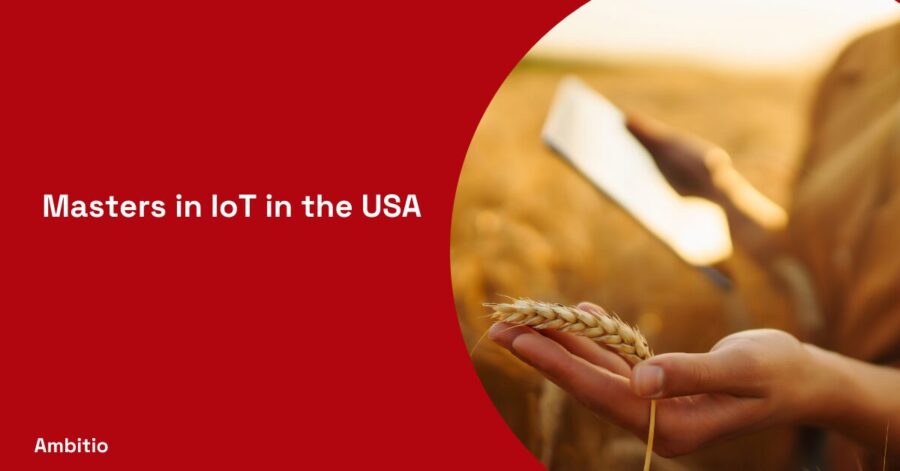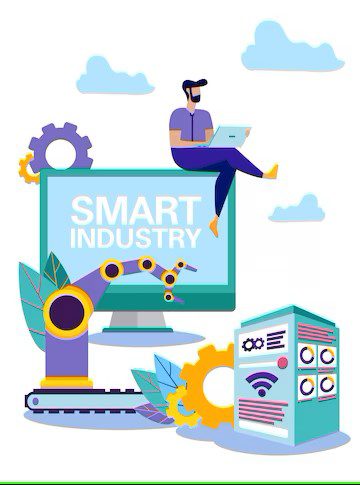11 December 2024
6 minutes read
Masters in IoT in the USA

Key Takeaways
- IoT Master’s programs develop skills for managing IoT technologies in various sectors.
- U.S. universities offer IoT programs with a focus on engineering, analytics, and machine learning.
- Programs include industry projects and collaborations, enhancing job readiness.
- Graduates can pursue careers in diverse industries, including healthcare and smart cities.
- Online IoT Master’s options cater to working professionals.
Introduction to the MS in IoT in the USA
The Internet of Things (IoT) is revolutionizing our world, connecting countless devices and enabling smarter operations in industries as varied as healthcare, agriculture, and transportation. This transformation is driving demand for skilled professionals who can develop and manage IoT technologies.
A Master of Science in IoT prepares graduates to be at the forefront of this exciting field. Top institutions like Northeastern University are offering comprehensive programs that integrate aspects of computer engineering, data analytics, and machine learning, making them ideal for those seeking a career in this innovative area.
Understanding IoT and Its Impact
Overview of IoT
IoT refers to the network of interconnected devices that communicate and exchange data. This emerging technology impacts everyday life, from smart homes to intelligent transportation systems. IoT devices range from simple sensors to complex systems, all working together to turn data into intelligence.
IoT in Today’s World: Applications and Advancements
IoT’s applications are diverse, affecting sectors like smart grid technology, healthcare monitoring, and automated manufacturing. Advancements in embedded systems and network technologies are continuously expanding IoT’s capabilities, making it a pivotal element in the ever-evolving tech industry.
Why Study IoT in the USA?
The USA as a Hub for IoT Innovation
The USA is home to leading tech companies and research institutions, making it a hotspot for IoT innovation. Universities like Northeastern and Florida International University offer cutting-edge IoT programs, combining theoretical knowledge with experiential learning opportunities.
Benefits of Studying IoT in the USA
Studying in the USA provides access to advanced IoT research, industry connections, and career opportunities. Programs often include hands-on projects and collaborations with industry partners, ensuring graduates are well-prepared for the IoT world.
Top Universities for IoT Masters in the USA

| University | Program Highlights | Specializations Offered | Duration | Mode of Study |
|---|---|---|---|---|
| Northeastern University | Cutting-edge curriculum, strong industry connections | Network Security, Data Analytics, Cyber-Physical Systems | 2 years | Full-time/Part-time |
| Florida International University | Innovative approach, extensive research opportunities | Smart Systems, Machine Learning, Electrical Engineering | 2 years | Full-time |
| University of California, Berkeley | Focus on advanced IoT technologies, hands-on projects | Embedded Systems, IoT for Healthcare, Smart Cities | 1.5 years | Full-time |
| Stanford University | Interdisciplinary approach, renowned faculty | AI and IoT Integration, IoT Security, Data Management | 2 years | Full-time |
| Carnegie Mellon University | State-of-the-art labs, practical learning emphasis | IoT Analytics, Intelligent Infrastructure, Robotics | 1.5 years | Full-time |
Curriculum and Specializations
| Course Component | Description | Examples of Specializations |
|---|---|---|
| Core IoT Subjects | Fundamental topics essential for understanding IoT technologies and systems | Network Security, Data Analytics |
| Advanced IoT Technologies | In-depth study of cutting-edge IoT technologies and their applications | Smart Grids, IoT for Healthcare |
| Embedded Systems and Networks | Focus on the design and development of embedded systems and IoT networks | Embedded Systems Design, IoT Protocols |
| Data Management and Analytics | Techniques for managing and analyzing data generated by IoT devices | Big Data Analytics, Machine Learning in IoT |
| IoT Security | Study of security protocols and privacy concerns in IoT systems | Cybersecurity, Privacy in IoT |
| Project and Practical Work | Hands-on experience through projects and lab work | Capstone Projects, IoT Lab Experiments |
| Electives | Specialized courses allow for a deeper exploration of specific IoT areas | Intelligent Transportation Systems, IoT in Smart Cities |
| Research Opportunities | Opportunities to engage in IoT-related research projects | Thesis, Research Assistantships |
Admission Requirements and Process
Admission Requirements for Masters in IoT Programs
| Requirement Type | Description |
|---|---|
| Academic Background | Bachelor’s degree in a related field (e.g., Computer Science, Electrical Engineering, or related field). |
| GPA | Minimum Grade Point Average (GPA), often around 3.0 or higher on a 4.0 scale. |
| Test Scores | GRE scores may be required (varies by program). |
| English Proficiency | TOEFL, IELTS, or equivalent test scores for non-native English speakers. |
| Letters of Recommendation | Typically two to three letters from academic or professional references. |
| Statement of Purpose | A personal essay outlining the applicant’s goals, interests, and reasons for pursuing the degree. |
| Relevant Experience | Work experience in a related field may be preferred or required for some programs. |
| Prerequisite Courses | Some programs may require completion of prerequisite courses in areas like programming or electronics. |
Quick Tips!
- When choosing an IoT Master’s program, consider factors such as the program’s curriculum, faculty expertise, industry connections, and hands-on learning opportunities.
- Prepare a strong application by highlighting relevant academic backgrounds, work experiences, and a clear statement of purpose expressing your interest in IoT.
- Leverage the program’s network and experiential learning opportunities to build connections and gain practical experience in the IoT field.
Admission Process: Steps to Apply for a Masters in IoT Program
- Research and Select Programs: Start by researching different universities and IoT programs. Consider factors like curriculum, faculty expertise, location, and cost.
- Check Specific Requirements: Each program has its own set of admission requirements. Review these carefully and ensure you meet all the criteria.
- Prepare Required Documents: Gather all necessary documents, including academic transcripts, test scores (GRE, TOEFL/IELTS), letters of recommendation, and your statement of purpose.
- Complete Prerequisite Courses (if needed): If the program requires prerequisite courses, ensure these are completed before applying.
- Submit Online Application: Fill out the application form on the university’s website. This typically involves providing personal information, and educational background, and uploading required documents.
- Pay Application Fee: Most applications require a fee. Ensure you pay this by the deadline to complete your application process.
- Attend Interviews (if required): Some programs may invite candidates for interviews. Prepare to discuss your background, interests, and motivations for studying IoT.
- Wait for Admission Decision: After submitting your application, there will be a waiting period while your application is reviewed.
- Accept Offer and Complete Enrollment: If accepted, review and accept the admission offer. Complete any additional steps required for enrollment, such as registering for classes or arranging accommodation.
- Apply for Visas and Financial Aid (if applicable): International students should apply for student visas. Also, consider applying for scholarships or financial aid if available.
IoT applications are transforming industries by enabling smart operations in fields as diverse as agriculture, healthcare, and transportation, showcasing the broad impact and potential of IoT technologies.
Career Opportunities in IoT

| Job Role | Description | Industry Applications |
|---|---|---|
| IoT Solution Architect | Designs and manages comprehensive IoT solutions, overseeing the integration of different IoT devices and systems | Smart Cities, Industrial Automation, Healthcare |
| Data Analyst | Analyzes data collected from IoT devices to derive insights and inform decision-making | Retail, Energy, Transportation |
| System Integrator | Integrates various IoT components and systems to ensure seamless operation and connectivity | Manufacturing, Smart Homes, Automotive |
| IoT Product Manager | Oversees the development and management of IoT products, from concept to market launch | Consumer Electronics, Wearables, Smart Appliances |
| Network Security Specialist | Ensures the security and integrity of IoT networks, protecting against cyber threats | Finance, Government, Healthcare |
| IoT Developer | Develops and programs IoT devices and systems, working with hardware and software | Software Companies, Tech Startups, R&D Labs |
| IoT Research Scientist | Research to advance IoT technology, developing new applications, and improving existing systems | Academia, Research Institutes, Tech Companies |
| IoT Sales Engineer | Combines technical knowledge of IoT with sales skills to help customers understand and adopt IoT solutions | B2B Sales, Tech Companies, Consulting Firms |
Conclusion
A Master of Science in IoT is a gateway to an exciting and rapidly evolving field. With comprehensive programs offered by institutions like Northeastern University and Florida International University, graduates are well-equipped to contribute to and lead in the world of IoT.
Whether you’re interested in smart transportation, healthcare innovation, or intelligent systems, a degree in IoT opens up a world of possibilities.
Chart your course to academic success with Ambitio – Study in USA companion! Join a global family, learn from the brightest minds, and embark on hands-on adventures. Your educational journey begins now – Explore Top USA Universities.
FAQs
What are the prerequisites for enrolling in a Master’s program in IoT?
To enroll in a Master of Science in IoT program, candidates typically need a bachelor’s degree in a related field such as computer science, electrical engineering, or a closely related field. A strong foundation in mathematics, programming, and, in some cases, basic knowledge of IoT principles is also advantageous. Some programs may require GRE scores or relevant work experience in the technology sector.
Can I pursue a Master’s in IoT if my undergraduate degree is not in a related field?
While a background in a related field is preferred, some universities may accept students from other disciplines, provided they have relevant work experience or have completed prerequisite courses in computer science, electronics, or networking. It’s important to check the specific requirements of each university.
How long does it take to complete a Master’s degree in IoT?
Most Master’s programs in IoT take about one to two years to complete. The duration may vary depending on the university, the program’s structure (full-time or part-time), and whether the program includes a thesis or capstone project.
What career opportunities are available after completing a Master’s in IoT?
Graduates can pursue various roles, including IoT solution architect, system integrator, data analyst, IoT product manager, and network security specialist. They can work in industries like automotive, healthcare, smart cities, industrial automation, and more.
Is it possible to pursue a Master’s in IoT through online or distance learning?
Yes, several universities offer online or distance learning options for pursuing a Master’s in IoT. These programs are designed to provide flexibility for working professionals and those who cannot attend on-campus courses. However, it’s essential to ensure that the online program is accredited and offers a curriculum and learning experience comparable to on-campus programs.

You can study at top universities worldwide!
Get expert tips and tricks to get into top universities with a free expert session.
Book Your Free 30-Minute Session Now! Book a call now




























